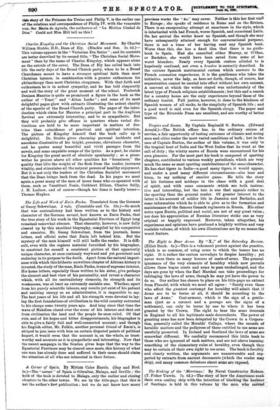Charles Kingsley and the Christian Social Morement. By Charles William
Stubbs, D.D., Dean of Ely. (Blackie and Son. 2s. 6d.)— This volume appears in the Victorian Era Series" ; and its contents are better described by its second title, " The Christian Social Move- ment" than by the name of Charles Kingsley, which appears alone on the outside of the cover. The Dean of Ely has called back into life the early days of the Broad Church party, when to be a Broad Churchman meant to have a stronger spiritual faith than most Christian laymen, in combination with a greater enthusiasm for philanthropy than most Christian clergymen. With that faith and enthusiasm he is in ardent sympathy, and he has told eloquently and well the story of the great moment of the school. Frederick Denison Maurice is quite as prominent a figure in the book as the author of Yeast " and Alton Locke" ; and some of its most delightful pages glow with extracts illustrating the ardent charity of the apostle of the Broad Church party. The pages of the intro- duction which claim for Maurice a principal part in the Anglican Revival are extremely interesting, and to us sympathetic. But they will probably give offence in quarters where verbal dis- tinctions are held to be more important in matters of doc- trine than coincidence of practical and spiritual intention. The picture of Kingsley himself that the book calls up is delightful. Dr. Stubbs gives charming personal incidents and anecdotes illustrative of his bright, generous, chivalrous character, and he quotes many beautiful and vivid passages from the novels, and some exquisite scraps of the lyrics. As a poet, he claims for Kingsley the great merit of absolute spontaneity ; as a prose- writer he praises above all other qualities his " breeziness," the quality that lifts the weight of the flesh from the reader, increases vitality, and stimulates all the natural powers of healthy enjoyment. But it is not only the leaders of the Christian Socialist movement that the Dean brings back from the dead. In his pages we meet again a great many of the men of lesser fame who co-operated with them, such as Vansittart Neale, Cuthbert Ellison, Charles Sully, J. M. Ludlow, and of course—though his fame is hardly lesser— Thomas Hughes.


















































 Previous page
Previous page